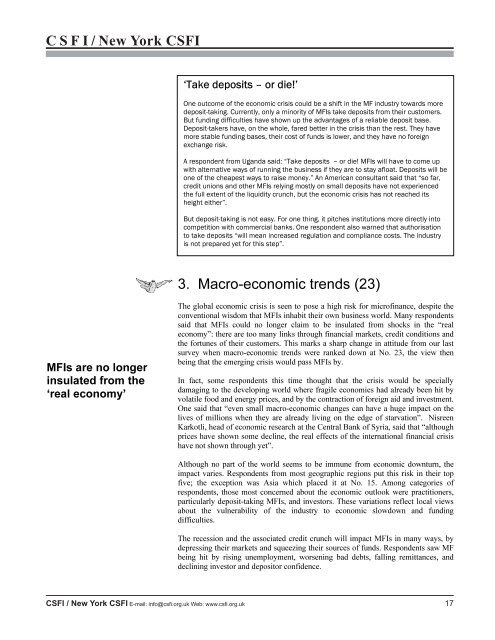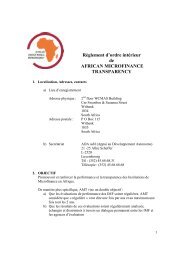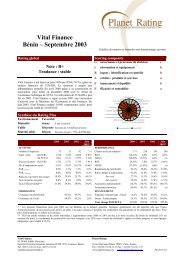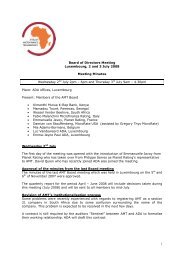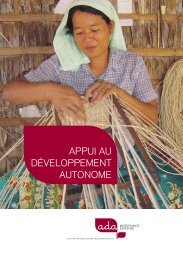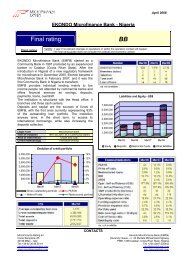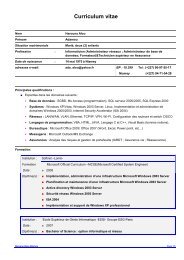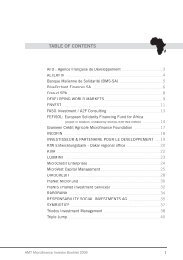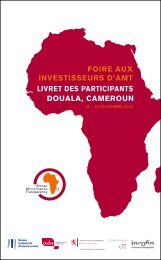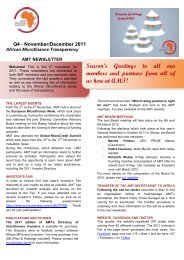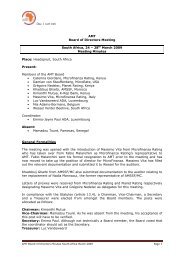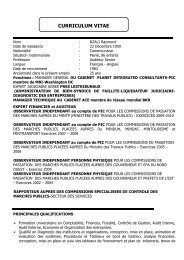Microfinance Banana Skins 2009 Microfinance Banana Skins 2009 - Le ...
Microfinance Banana Skins 2009 Microfinance Banana Skins 2009 - Le ...
Microfinance Banana Skins 2009 Microfinance Banana Skins 2009 - Le ...
You also want an ePaper? Increase the reach of your titles
YUMPU automatically turns print PDFs into web optimized ePapers that Google loves.
C S F I / New York CSFI‘Take deposits – or die!’One outcome of the economic crisis could be a shift in the MF industry towards moredeposit-taking. Currently, only a minority of MFIs take deposits from their customers.But funding difficulties have shown up the advantages of a reliable deposit base.Deposit-takers have, on the whole, fared better in the crisis than the rest. They havemore stable funding bases, their cost of funds is lower, and they have no foreignexchange risk.A respondent from Uganda said: “Take deposits – or die! MFIs will have to come upwith alternative ways of running the business if they are to stay afloat. Deposits will beone of the cheapest ways to raise money.” An American consultant said that “so far,credit unions and other MFIs relying mostly on small deposits have not experiencedthe full extent of the liquidity crunch, but the economic crisis has not reached itsheight either”.But deposit-taking is not easy. For one thing, it pitches institutions more directly intocompetition with commercial banks. One respondent also warned that authorisationto take deposits “will mean increased regulation and compliance costs. The industryis not prepared yet for this step”.3. Macro-economic trends (23)MFIs are no longerinsulated from the‘real economy’The global economic crisis is seen to pose a high risk for microfinance, despite theconventional wisdom that MFIs inhabit their own business world. Many respondentssaid that MFIs could no longer claim to be insulated from shocks in the “realeconomy”: there are too many links through financial markets, credit conditions andthe fortunes of their customers. This marks a sharp change in attitude from our lastsurvey when macro-economic trends were ranked down at No. 23, the view thenbeing that the emerging crisis would pass MFIs by.In fact, some respondents this time thought that the crisis would be speciallydamaging to the developing world where fragile economies had already been hit byvolatile food and energy prices, and by the contraction of foreign aid and investment.One said that “even small macro-economic changes can have a huge impact on thelives of millions when they are already living on the edge of starvation”. NisreenKarkotli, head of economic research at the Central Bank of Syria, said that “althoughprices have shown some decline, the real effects of the international financial crisishave not shown through yet”.Although no part of the world seems to be immune from economic downturn, theimpact varies. Respondents from most geographic regions put this risk in their topfive; the exception was Asia which placed it at No. 15. Among categories ofrespondents, those most concerned about the economic outlook were practitioners,particularly deposit-taking MFIs, and investors. These variations reflect local viewsabout the vulnerability of the industry to economic slowdown and fundingdifficulties.The recession and the associated credit crunch will impact MFIs in many ways, bydepressing their markets and squeezing their sources of funds. Respondents saw MFbeing hit by rising unemployment, worsening bad debts, falling remittances, anddeclining investor and depositor confidence.CSFI / New York CSFI E-mail: info@csfi.org.uk Web: www.csfi.org.uk 17


